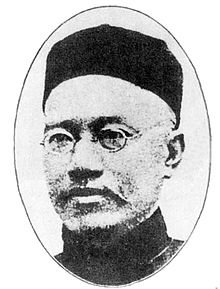Yan Fu
| Yan Fu | |
|---|---|
 |
|
| Born |
8 January 1854 Houguan, Fujian, Qing China |
| Died | 27 October 1921 (aged 67) Guanhang, Fuzhulang, Republican China |
| Alma mater | Royal Naval College, Greenwich |
| Notable work | Gong Jin'ou |
| Title | President of Fudan University |
| Term | 1906-1907 |
| Predecessor | Ma Xiangbo |
| Successor | Xia Jing'guan |
| Political party | Kuomintang |
Yan Fu (simplified Chinese: 严复; traditional Chinese: 嚴復; pinyin: Yán Fù; Wade–Giles: Yen² Fu⁴, IPA: [jɛ̌n.fû]; courtesy name: Ji Dao, 幾道; 8 January 1854 — 27 October 1921) was a Chinese scholar and translator, most famous for introducing western ideas, including Darwin's "natural selection", to China in the late 19th century.
On January 8, 1854, Yan Fu was born in what is modern day Fuzhou, Fujian Province to a respectable scholar-gentry family in the trade of Chinese medicine. In his early years, Yan Fu’s father greatly encouraged Yan Fu to obtain a high education and prepare for the Imperial examination. However, the death of his father in 1866 caused an abrupt change to these plans. A year later, Yan Fu entered the Fujian Arsenal Academy (福州船政學堂) in Fuzhou, a Western school where he studied a variety of subjects including English, arithmetic, geometry, algebra, trigonometry, physics, chemistry, astrology and navigation. This was a turning point in young Yan Fu’s life as he was able to experience first-hand contact with Western science, thus inspiring the enthusiasm that carried him through the rest of his career.
After graduating with high honors in 1871, Yan Fu went on to spend the next five years at sea. He first served aboard the training ship Jianwei (建威) and later on the battle cruiser Yangwu (陽武). In 1877–79 he studied at the Royal Naval College, Greenwich, England. During his years there, he became acquainted with China’s first ambassador Guo Songtao, and despite their age difference and status gap developed a strong friendship. Benjamin Schwartz mentions in his biography that "they often spent whole days and nights discussing differences and similarities in Chinese and Western thought and political institutions".
...
Wikipedia
